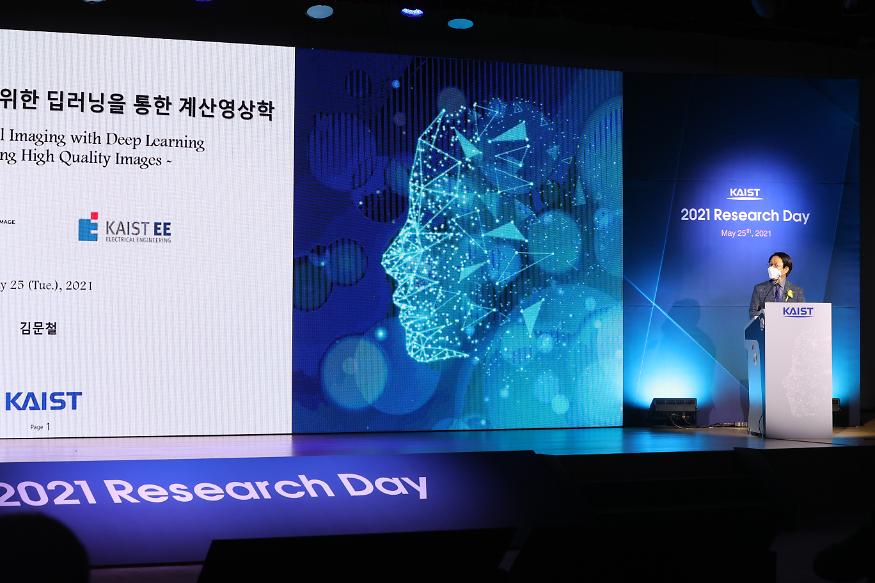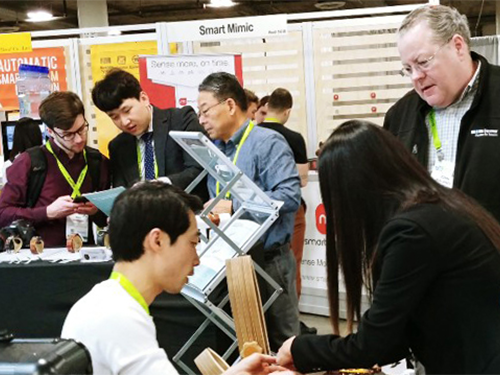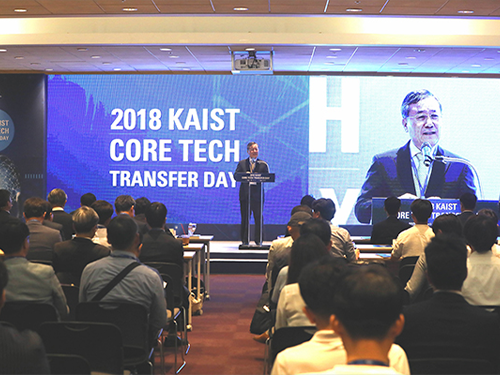Munchurl+Kim
-
 Research Day Highlights the Most Impactful Technologies of the Year
Technology Converting Full HD Image to 4-Times Higher UHD Via Deep Learning Cited as the Research of the Year
The technology converting a full HD image into a four-times higher UHD image in real time via AI deep learning was recognized as the Research of the Year. Professor Munchurl Kim from the School of Electrical Engineering who developed the technology won the Research of the Year Grand Prize during the 2021 KAIST Research Day ceremony on May 25. Professor Kim was lauded for conducting creative research on machine learning and deep learning-based image processing.
KAIST’s Research Day recognizes the most notable research outcomes of the year, while creating opportunities for researchers to immerse themselves into interdisciplinary research projects with their peers. The ceremony was broadcast online due to Covid-19 and announced the Ten R&D Achievement of the Year that are expected to make a significant impact.
To celebrate the award, Professor Kim gave a lecture on “Computational Imaging through Deep Learning for the Acquisition of High-Quality Images.” Focusing on the fact that advancements in artificial intelligence technology can show superior performance when used to convert low-quality videos to higher quality, he introduced some of the AI technologies that are currently being applied in the field of image restoration and quality improvement.
Professors Eui-Cheol Shin from the Graduate School of Medical Science and Engineering and In-Cheol Park from the School of Electrical Engineering each received Research Awards, and Professor Junyong Noh from the Graduate School of Culture Technology was selected for the Innovation Award. Professors Dong Ki Yoon from the Department of Chemistry and Hyungki Kim from the Department of Mechanical Engineering were awarded the Interdisciplinary Award as a team for their joint research.
Meanwhile, out of KAIST’s ten most notable R&D achievements, those from the field of natural and biological sciences included research on rare earth element-platinum nanoparticle catalysts by Professor Ryong Ryoo from the Department of Chemistry, real-time observations of the locational changes in all of the atoms in a molecule by Professor Hyotcherl Ihee from the Department of Chemistry, and an investigation on memory retention mechanisms after synapse removal from an astrocyte by Professor Won-Suk Chung from the Department of Biological Sciences.
Awardees from the engineering field were a wearable robot for paraplegics with the world’s best functionality and walking speed by Professor Kyoungchul Kong from the Department of Mechanical Engineering, fair machine learning by Professor Changho Suh from the School of Electrical Engineering, and a generative adversarial networks processing unit (GANPU), an AI semiconductor that can learn from even mobiles by processing multiple and deep networks by Professor Hoi-Jun Yoo from the School of Electrical Engineering.
Others selected as part of the ten research studies were the development of epigenetic reprogramming technology in tumour by Professor Pilnam Kim from the Department of Bio and Brain Engineering, the development of an original technology for reverse cell aging by Professor Kwang-Hyun Cho from the Department of Bio and Brain Engineering, a heterogeneous metal element catalyst for atmospheric purification by Professor Hyunjoo Lee from the Department of Chemical and Biomolecular Engineering, and the Mobile Clinic Module (MCM): a negative pressure ward for epidemic hospitals by Professor Taek-jin Nam (reported at the Wall Street Journal) from the Department of Industrial Design.
2021.05.31 View 16963
Research Day Highlights the Most Impactful Technologies of the Year
Technology Converting Full HD Image to 4-Times Higher UHD Via Deep Learning Cited as the Research of the Year
The technology converting a full HD image into a four-times higher UHD image in real time via AI deep learning was recognized as the Research of the Year. Professor Munchurl Kim from the School of Electrical Engineering who developed the technology won the Research of the Year Grand Prize during the 2021 KAIST Research Day ceremony on May 25. Professor Kim was lauded for conducting creative research on machine learning and deep learning-based image processing.
KAIST’s Research Day recognizes the most notable research outcomes of the year, while creating opportunities for researchers to immerse themselves into interdisciplinary research projects with their peers. The ceremony was broadcast online due to Covid-19 and announced the Ten R&D Achievement of the Year that are expected to make a significant impact.
To celebrate the award, Professor Kim gave a lecture on “Computational Imaging through Deep Learning for the Acquisition of High-Quality Images.” Focusing on the fact that advancements in artificial intelligence technology can show superior performance when used to convert low-quality videos to higher quality, he introduced some of the AI technologies that are currently being applied in the field of image restoration and quality improvement.
Professors Eui-Cheol Shin from the Graduate School of Medical Science and Engineering and In-Cheol Park from the School of Electrical Engineering each received Research Awards, and Professor Junyong Noh from the Graduate School of Culture Technology was selected for the Innovation Award. Professors Dong Ki Yoon from the Department of Chemistry and Hyungki Kim from the Department of Mechanical Engineering were awarded the Interdisciplinary Award as a team for their joint research.
Meanwhile, out of KAIST’s ten most notable R&D achievements, those from the field of natural and biological sciences included research on rare earth element-platinum nanoparticle catalysts by Professor Ryong Ryoo from the Department of Chemistry, real-time observations of the locational changes in all of the atoms in a molecule by Professor Hyotcherl Ihee from the Department of Chemistry, and an investigation on memory retention mechanisms after synapse removal from an astrocyte by Professor Won-Suk Chung from the Department of Biological Sciences.
Awardees from the engineering field were a wearable robot for paraplegics with the world’s best functionality and walking speed by Professor Kyoungchul Kong from the Department of Mechanical Engineering, fair machine learning by Professor Changho Suh from the School of Electrical Engineering, and a generative adversarial networks processing unit (GANPU), an AI semiconductor that can learn from even mobiles by processing multiple and deep networks by Professor Hoi-Jun Yoo from the School of Electrical Engineering.
Others selected as part of the ten research studies were the development of epigenetic reprogramming technology in tumour by Professor Pilnam Kim from the Department of Bio and Brain Engineering, the development of an original technology for reverse cell aging by Professor Kwang-Hyun Cho from the Department of Bio and Brain Engineering, a heterogeneous metal element catalyst for atmospheric purification by Professor Hyunjoo Lee from the Department of Chemical and Biomolecular Engineering, and the Mobile Clinic Module (MCM): a negative pressure ward for epidemic hospitals by Professor Taek-jin Nam (reported at the Wall Street Journal) from the Department of Industrial Design.
2021.05.31 View 16963 -
 KAIST Presents Innovations at CES 2019
Ten of the most innovative technologies spun off from KAIST made a debut at the Consumer Electronics Show (CES) 2019, the world’s largest consumer electronics and IT exhibition being held in Las Vegas from January 8 to 11. The KAIST booth at the CES featured technologies made by KAIST research teams and five startup companies including LiBEST, Memslux, and Green Power. In particular, the KAIST Alumni Association invited 33 aspiring alumni entrepreneurs selected from the KAIST Startup Competition to the show.
At the exhibition, KAIST is presenting innovations in the fields of AI and Bio-IT convergence for the Fourth Industrial Revolution. These include real-time upscaling from Full HD to 4K UHD using AI deep learning-based convolutional neural networks (Professor Munchurl Kim, School of Electrical Engineering) and an AI conversation agent that responds to user’s emotions (Professor Soo-Young Lee, School of Electrical Engineering).
Other technologies include optimal drug target identification by cancer cell type through drug response prediction to be used in personalized cancer treatments (Professor Kwang-Hyun Cho, Department of Bio and Brain Engineering), a nanofiber-based color changing gas sensor with greater sensitivity than conventional paper-based color changing sensors (Professor Il-Doo Kim, Department of Materials Science and Engineering), and functional near-infrared spectroscopy (fNIRS) for brain imaging and muscle fatigue measurement (Professor Hyeonmin Bae, School of Electrical Engineering).
The KAIST booth also features startups founded by KAIST alumni including LiBEST with a flexible lithium polymer secondary cell optimized for smart wearable devices and Rempus with a high-performance lithium ion cell packaging technology for outstanding safety, high capacity, long life, and fast charging.
Green Power and Smart Radar Systems are also joining the booth with a highly efficient and eco-friendly wireless charging system for electrical cars, and a 4D image radar sensor that detects 3D images and speed in real time for applications in self-driving cars, drones, and security systems respectively.
Faculty-founded startup Memslux (CEO Jun-Bo Yoon, School of Electrical Engineering) is presenting a transparent surface light source solution for next-generation display devices.
Associate Vice President of Office of University-Industry Cooperation Kyung Cheol Choi said, “I believe that universities should play a role in connecting technological innovations to business startups for creating value at a global level. In that sense, it is a great opportunity to present innovative technologies from KAIST and promote outstanding KAIST startups at CES 2019. Hopefully, this experience will lead to joint R&D, investment, cooperation, and international technology transfer contracts with leading companies from around the world.”
Here are the five key technologies presented by KAIST at CES 2019.
2019.01.10 View 9291
KAIST Presents Innovations at CES 2019
Ten of the most innovative technologies spun off from KAIST made a debut at the Consumer Electronics Show (CES) 2019, the world’s largest consumer electronics and IT exhibition being held in Las Vegas from January 8 to 11. The KAIST booth at the CES featured technologies made by KAIST research teams and five startup companies including LiBEST, Memslux, and Green Power. In particular, the KAIST Alumni Association invited 33 aspiring alumni entrepreneurs selected from the KAIST Startup Competition to the show.
At the exhibition, KAIST is presenting innovations in the fields of AI and Bio-IT convergence for the Fourth Industrial Revolution. These include real-time upscaling from Full HD to 4K UHD using AI deep learning-based convolutional neural networks (Professor Munchurl Kim, School of Electrical Engineering) and an AI conversation agent that responds to user’s emotions (Professor Soo-Young Lee, School of Electrical Engineering).
Other technologies include optimal drug target identification by cancer cell type through drug response prediction to be used in personalized cancer treatments (Professor Kwang-Hyun Cho, Department of Bio and Brain Engineering), a nanofiber-based color changing gas sensor with greater sensitivity than conventional paper-based color changing sensors (Professor Il-Doo Kim, Department of Materials Science and Engineering), and functional near-infrared spectroscopy (fNIRS) for brain imaging and muscle fatigue measurement (Professor Hyeonmin Bae, School of Electrical Engineering).
The KAIST booth also features startups founded by KAIST alumni including LiBEST with a flexible lithium polymer secondary cell optimized for smart wearable devices and Rempus with a high-performance lithium ion cell packaging technology for outstanding safety, high capacity, long life, and fast charging.
Green Power and Smart Radar Systems are also joining the booth with a highly efficient and eco-friendly wireless charging system for electrical cars, and a 4D image radar sensor that detects 3D images and speed in real time for applications in self-driving cars, drones, and security systems respectively.
Faculty-founded startup Memslux (CEO Jun-Bo Yoon, School of Electrical Engineering) is presenting a transparent surface light source solution for next-generation display devices.
Associate Vice President of Office of University-Industry Cooperation Kyung Cheol Choi said, “I believe that universities should play a role in connecting technological innovations to business startups for creating value at a global level. In that sense, it is a great opportunity to present innovative technologies from KAIST and promote outstanding KAIST startups at CES 2019. Hopefully, this experience will lead to joint R&D, investment, cooperation, and international technology transfer contracts with leading companies from around the world.”
Here are the five key technologies presented by KAIST at CES 2019.
2019.01.10 View 9291 -
 KAIST Core Technology Fair Accelerates Commercialization
(President Shin makes opening remarks at the KAIST Core Tech Transfer Day in Seoul.)
Technology commercialization is the one of the innovation initiatives KAIST is strongly driving. KAIST showcased six core technologies developed by KAIST research teams during the 2018 KAIST Core Tech Transfer Day on September 10 at Coex in Seoul. More than 300 investors, buyers, and venture capitalists showed up for the fair. This is the second fair organized as one of the strategic innovation initiatives that KAIST is promoting.
Developers of key technologies selected in the fields of bio, nano, AI, and semiconductors presented their distinct technological prowess to the attendees. The technologies are highly relevant for the new industrial environment trends in the Fourth Industrial Revolution.
The 15-member committee comprised of patent attorneys, venture capitalists, and commercialization specialists selected the six core technologies based on their innovativeness, applicability, and marketability. The Office of University-Industry Cooperation (OUIC) plans to offer buyers various services for developing business models, business strategy analysis, and marketing at home and abroad. The six core technologies featured at the fair include:
- Novel technology of a nano patterning platform by Professor Hee Tae Chung from the Department of Chemical and Biomolecular Engineering
- Anticancer therapeutic candidate materials strengthening immune function by Professor Byung Sok Choi from the Department of Chemistry
- Biofuel mass production using micro-organisms by Distinguished Professor Sang-Yup Lee from the Department of Chemical and Biomolecular Engineering
- Compact single-shot hyperspectral camera technology by Min Hyuk Kim from the School of Computing
- AI-powered high speed ultra-high definition upscaling technology by Professor Munchurl Kim from the School of Electrical Engineering - A radiation strong MOSFET device by Hee Chul Lee from the School of Electrical Engineering
President Sung-Chul Shin stressed in his opening remarks that universities should make contributions to economic development through innovation. “Global leading universities are taking an instrumental role in creating new jobs and economic growth with their own technologies. KAIST, as the leading university in Korea, is accelerating the commercialization of technology produced internally to create a meaningful impact for the economy as well as the job market beyond Korea,” he said.
“We are aiming for the global market, not just in Korea. I want KAIST to be a global value creator that can contribute to the betterment of the world through our innovations,” he added.
2018.09.10 View 7113
KAIST Core Technology Fair Accelerates Commercialization
(President Shin makes opening remarks at the KAIST Core Tech Transfer Day in Seoul.)
Technology commercialization is the one of the innovation initiatives KAIST is strongly driving. KAIST showcased six core technologies developed by KAIST research teams during the 2018 KAIST Core Tech Transfer Day on September 10 at Coex in Seoul. More than 300 investors, buyers, and venture capitalists showed up for the fair. This is the second fair organized as one of the strategic innovation initiatives that KAIST is promoting.
Developers of key technologies selected in the fields of bio, nano, AI, and semiconductors presented their distinct technological prowess to the attendees. The technologies are highly relevant for the new industrial environment trends in the Fourth Industrial Revolution.
The 15-member committee comprised of patent attorneys, venture capitalists, and commercialization specialists selected the six core technologies based on their innovativeness, applicability, and marketability. The Office of University-Industry Cooperation (OUIC) plans to offer buyers various services for developing business models, business strategy analysis, and marketing at home and abroad. The six core technologies featured at the fair include:
- Novel technology of a nano patterning platform by Professor Hee Tae Chung from the Department of Chemical and Biomolecular Engineering
- Anticancer therapeutic candidate materials strengthening immune function by Professor Byung Sok Choi from the Department of Chemistry
- Biofuel mass production using micro-organisms by Distinguished Professor Sang-Yup Lee from the Department of Chemical and Biomolecular Engineering
- Compact single-shot hyperspectral camera technology by Min Hyuk Kim from the School of Computing
- AI-powered high speed ultra-high definition upscaling technology by Professor Munchurl Kim from the School of Electrical Engineering - A radiation strong MOSFET device by Hee Chul Lee from the School of Electrical Engineering
President Sung-Chul Shin stressed in his opening remarks that universities should make contributions to economic development through innovation. “Global leading universities are taking an instrumental role in creating new jobs and economic growth with their own technologies. KAIST, as the leading university in Korea, is accelerating the commercialization of technology produced internally to create a meaningful impact for the economy as well as the job market beyond Korea,” he said.
“We are aiming for the global market, not just in Korea. I want KAIST to be a global value creator that can contribute to the betterment of the world through our innovations,” he added.
2018.09.10 View 7113